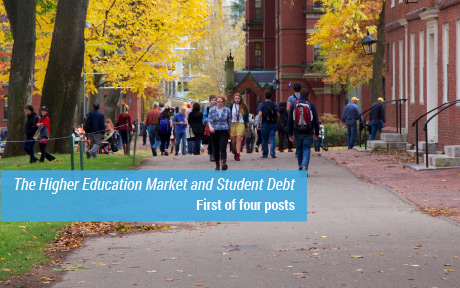Diplomas to Doorsteps: Education, Student Debt, and Homeownership
At the N.Y. Fed: Press Briefing on Household Borrowing with Close‑Up on Student Debt

An examination of recent developments in household borrowing was the focus of a press briefing held this morning at the New York Fed.
Who Falters at Student Loan Payback Time?
This is the final post in a four-part series examining the evolution of enrollment, student loans, graduation and default in the higher education market over the course of the past fifteen years.
The Changing Role of Community‑College and For‑Profit‑College Borrowers in the Student Loan Market
In the first post in this series, we characterized the rapid transformation of the higher education market over the 2000-2015 period, a transformation that was led by explosive growth of the for-profit sector of higher education.
The Changing Higher Education Landscape
Human Capital and Education in Puerto Rico
An important element of human capital is educational attainment. A series of recent papers highlights the importance of the quality of education—which determines the skills actually learned, rather than the number of years spent in a classroom—as a main driver of growth.
Just Released: Mapping the Differences in School Spending in New York City

Rajashri Chakrabarti and Michael Stewart This morning, the Federal Reserve Bank of New York released a set of interactive visuals that present data on school spending and its various components—such as instructional spending, instructional support, leadership support, and building services spending—across all thirty-two community school districts (CSD) in New York City and map their progression […]
Just Released: New Web Feature Provides Timely Data on the Job Market for Recent College Graduates
Jaison R. Abel and Richard Deitz Many newly minted college graduates entering the labor market in the wake of the Great Recession have had a tough time finding good jobs. But just how difficult has it been, and are things getting better? And for which graduates? These questions can be difficult to answer because timely […]
Working as a Barista After College Is Not as Common as You Might Think
Jaison R. Abel and Richard Deitz The image of a newly minted college graduate working behind the counter of a hip coffee shop has become a hallmark of the plight of recent college graduates following the Great Recession. Recurring news stories about young college graduates stuck in low-skilled jobs make it easy to see why […]

















 RSS Feed
RSS Feed Follow Liberty Street Economics
Follow Liberty Street Economics